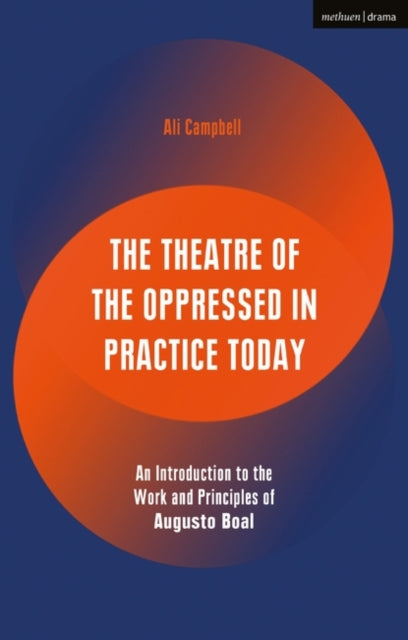AliCampbell
Theatre of the Oppressed in Practice Today: An Introduction to the Work and Principles of Augusto Boal
Theatre of the Oppressed in Practice Today: An Introduction to the Work and Principles of Augusto Boal
- Condition: Brand new
- UK Delivery times: Usually arrives within 2 - 3 working days
- UK Shipping: Fee starts at £2.39. Subject to product weight & dimension
Bulk ordering. Want 15 or more copies? Get a personalised quote and bigger discounts. Learn more about bulk orders.
Couldn't load pickup availability
- More about Theatre of the Oppressed in Practice Today: An Introduction to the Work and Principles of Augusto Boal
This book provides an accessible introduction to the political and artistic principles of Augusto Boal's Theatre of the Oppressed, tracing exemplary practice from around the globe. It demonstrates how the underlying principles of Boal's practice are enacted in the work of various theatre groups, including an urban network, a rural and developmental theatre organisation, and a theatre-based group led by learning-disabled adults. The book concludes with conversations between Ali Campbell and international exponents of the work, envisioning futures for the Theatre of the Oppressed in the twenty-first century.
Format: Paperback / softback
Length: 264 pages
Publication date: 21 March 2019
Publisher: Bloomsbury Publishing PLC
Augusto Boal's Theatre of the Oppressed has had a significant impact on the world, with its principles and techniques being interpreted and practiced in various contexts. This book offers an accessible introduction to the political and artistic foundations of Boal's work, showcasing exemplary practices from around the globe. Theatre artist, scholar, and activist Ali Campbell demonstrates how the underlying principles of Boal's practice are being enacted in the work of various organizations. Through detailed contemporary case histories, Campbell highlights how the Theatre of the Oppressed is being applied in urban settings, rural communities, and disability-led groups. The book concludes with conversations between Campbell and international experts in the field, exploring the future of the Theatre of the Oppressed in the changing political, educational, and artistic landscapes of the twenty-first century.
Introduction:
Augusto Boal's Theatre of the Oppressed has gained widespread recognition as a powerful tool for social change and artistic expression. Its principles and techniques have been adopted by theater artists, activists, and educators across the globe, leading to diverse interpretations and practices. In this essay, we will explore how the work and legacy of Theatre of the Oppressed have been interpreted and practiced around the world, with a particular focus on its application in different working contexts.
Interpretations and Practices:
The Theatre of the Oppressed has been interpreted and practiced in various ways, reflecting the diverse cultural and social contexts in which it has been applied. Some practitioners view it as a form of resistance against oppressive systems and structures, while others see it as a means of promoting social justice and human rights. Regardless of the interpretation, the core principles of Theatre of the Oppressed remain the same: the use of theater as a tool for empowerment, the exploration of power dynamics, and the promotion of dialogue and understanding.
Urban Context:
One of the most prominent examples of Theatre of the Oppressed in urban contexts is the Theatre of the Oppressed NYC (TOTNYC). Founded in 1971 by Augusto Boal and a group of theater artists, TOTNYC has been using theater to address social and political issues in New York City for over four decades. TOTNYC's approach is rooted in the principles of the Theatre of the Oppressed, including the use of games, exercises, and role-playing to explore and challenge power dynamics.
Rural Context:
In rural contexts, the Theatre of the Oppressed has been used to promote community development and empowerment. Jana Sanskriti, a rural and developmental theatre organization based in West Bengal, India, is one such example. Jana Sanskriti uses theater to address issues such as gender inequality, poverty, and environmental degradation, and has been successful in engaging with local communities and promoting change.
Disability-Led Groups:
Theatre of the Oppressed has also been used by disability-led groups to promote self-expression, social inclusion, and empowerment. The Lawnmowers Independent Theatre Company, based in the UK, is a theater-based group led by learning-disabled adults. The group uses theater to explore themes such as identity, discrimination, and social exclusion, and has been recognized for its innovative and powerful approach to theater-making.
Conclusion:
The work and legacy of Theatre of the Oppressed continue to inspire and influence theater artists, activists, and educators around the world. Its principles and techniques have been used to address a wide range of social and political issues, from oppression and inequality to environmental degradation and social exclusion. As the world continues to evolve, it is important to continue to adapt and refine the Theatre of the Oppressed to meet the changing needs of communities and individuals.
Weight: 344g
Dimension: 195 x 173 x 9 (mm)
ISBN-13: 9781350031418
This item can be found in:
UK and International shipping information
UK and International shipping information
UK Delivery and returns information:
- Delivery within 2 - 3 days when ordering in the UK.
- Shipping fee for UK customers from £2.39. Fully tracked shipping service available.
- Returns policy: Return within 30 days of receipt for full refund.
International deliveries:
Shulph Ink now ships to Australia, Belgium, Canada, France, Germany, Ireland, Italy, India, Luxembourg Saudi Arabia, Singapore, Spain, Netherlands, New Zealand, United Arab Emirates, United States of America.
- Delivery times: within 5 - 10 days for international orders.
- Shipping fee: charges vary for overseas orders. Only tracked services are available for most international orders. Some countries have untracked shipping options.
- Customs charges: If ordering to addresses outside the United Kingdom, you may or may not incur additional customs and duties fees during local delivery.


